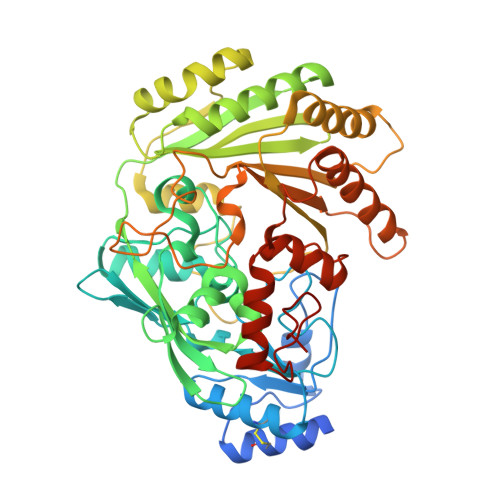Discovery of fungal oligosaccharide-oxidising flavo-enzymes with previously unknown substrates, redox-activity profiles and interplay with LPMOs.
Haddad Momeni, M., Fredslund, F., Bissaro, B., Raji, O., Vuong, T.V., Meier, S., Nielsen, T.S., Lombard, V., Guigliarelli, B., Biaso, F., Haon, M., Grisel, S., Henrissat, B., Welner, D.H., Master, E.R., Berrin, J.G., Abou Hachem, M.(2021) Nat Commun 12: 2132-2132
- PubMed: 33837197
- DOI: https://doi.org/10.1038/s41467-021-22372-0
- Primary Citation of Related Structures:
6YJI, 6YJO - PubMed Abstract:
Oxidative plant cell-wall processing enzymes are of great importance in biology and biotechnology. Yet, our insight into the functional interplay amongst such oxidative enzymes remains limited. Here, a phylogenetic analysis of the auxiliary activity 7 family (AA7), currently harbouring oligosaccharide flavo-oxidases, reveals a striking abundance of AA7-genes in phytopathogenic fungi and Oomycetes. Expression of five fungal enzymes, including three from unexplored clades, expands the AA7-substrate range and unveils a cellooligosaccharide dehydrogenase activity, previously unknown within AA7. Sequence and structural analyses identify unique signatures distinguishing the strict dehydrogenase clade from canonical AA7 oxidases. The discovered dehydrogenase directly is able to transfer electrons to an AA9 lytic polysaccharide monooxygenase (LPMO) and fuel cellulose degradation by LPMOs without exogenous reductants. The expansion of redox-profiles and substrate range highlights the functional diversity within AA7 and sets the stage for harnessing AA7 dehydrogenases to fine-tune LPMO activity in biotechnological conversion of plant feedstocks.
- Department of Biotechnology and Biomedicine, Technical University of Denmark, Lyngby, Denmark.
Organizational Affiliation:


















